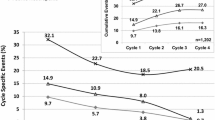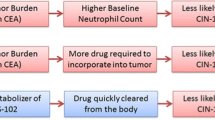Abstract
Background
Chemotherapy-induced neutropenia (CIN) places patients at risk of life-threatening infections. While reduction of chemotherapy dose or delay of the subsequent treatment cycle and, consequently, reduction of relative dose intensity (RDI) may limit myelotoxicity, these actions can also impact adversely on treatment outcome and should be avoided in adjuvant settings.
Patients and methods
Based on data from 444 breast cancer patients in the INC-EU Prospective Observational European Neutropenia Study, we have evaluated patient-specific and treatment-specific factors that impact on the incidence of grade 4 CIN (absolute neutrophil count <0.5 × 109/L), either during the first or in any cycle of (neo)adjuvant chemotherapy, across a range of regimens and doses.
Results
Using multivariate logistic regression analysis, risk factors for grade 4 CIN were identified as older age, lower weight, higher planned dose intensity of doxorubicin, epirubicin, or docetaxel, higher number of planned cycles, vascular comorbidity, lower baseline white blood cell count, and higher baseline bilirubin. Use of colony-stimulating factor before a neutropenic event occurred, dose delays, and dose reductions were protective against grade 4 CIN.
Conclusions
By identifying risk factors for grade 4 CIN, CSF prophylaxis may be appropriately targeted to prevent low RDI in patients treated with curative intent.

Similar content being viewed by others
References
Ferlay J, Autier P, Boniol M, Heanue M, Colombet M, Boyle P (2007) Estimates of the cancer incidence and mortality in Europe in 2006. Ann Oncol 18(3):581–592
Bonadonna G, Moliterni A, Zambetti M, Daidone MG, Pilotti S, Gianni L, Valagussa P (2005) 30 years' follow up of randomised studies of adjuvant CMF in operable breast cancer: cohort study. Br Med J 330(7485):217
Bonadonna G, Valagussa P, Moliterni A, Zambetti M, Brambilla C (1995) Adjuvant cyclophosphamide, methotrexate, and fluorouracil in node-positive breast cancer: the results of 20 years of follow-up. N Engl J Med 332(14):901–906
Budman DR, Berry DA, Cirrincione CT, Henderson IC, Wood WC, Weiss RB, Ferree CR, Muss HB, Green MR, Norton L, Frei E 3rd (1998) Dose and dose intensity as determinants of outcome in the adjuvant treatment of breast cancer. The Cancer and Leukemia Group B. J Natl Cancer Inst 90(16):1205–1211
Chirivella I, Bermejo B, Insa A, Perez-Fidalgo A, Magro A, Rosello S, Garcia-Garre E, Martin P, Bosch A, Lluch A (2009) Optimal delivery of anthracycline-based chemotherapy in the adjuvant setting improves outcome of breast cancer patients. Breast Cancer Res Treat 114(3):479–484
von Minckwitz G, Schwenkglenks M, Skacel T, Lyman G, Lopez-Pousa A, Bacon P, Easton V, Aapro M (2009) Febrile neutropenia and related complications in breast cancer patients receiving pegfilgrastim primary prophylaxis versus current practice neutropenia management: results from an integrated analysis. Eur J Cancer 45(4):608–617
Leonard RC, Miles D, Thomas R, Nussey F (2003) Impact of neutropenia on delivering planned adjuvant chemotherapy: UK audit of primary breast cancer patients. Br J Cancer 89(11):2062–2068
Pettengell R, Schwenkglenks M, Leonard R, Bosly A, Paridaens R, Constenla M, Szucs TD, Jackisch C (2008) Neutropenia occurrence and predictors of reduced chemotherapy delivery: results from the INC-EU prospective observational European neutropenia study. Support Care Cancer 16(11):1299–1309
Kuderer NM, Dale DC, Crawford J, Lyman GH (2007) Impact of primary prophylaxis with granulocyte colony-stimulating factor on febrile neutropenia and mortality in adult cancer patients receiving chemotherapy: a systematic review. J Clin Oncol 25(21):3158–3167
Aapro MS, Cameron DA, Pettengell R, Bohlius J, Crawford J, Ellis M, Kearney N, Lyman GH, Tjan-Heijnen VC, Walewski J, Weber DC, Zielinski C (2006) EORTC guidelines for the use of granulocyte-colony stimulating factor to reduce the incidence of chemotherapy-induced febrile neutropenia in adult patients with lymphomas and solid tumours. Eur J Cancer 42(15):2433–2453
National Comprehensive Cancer Network Inc. (2008) NCCN clinical practice guidelines in oncology—breast cancer V.2.2008. Available at http://www.nccn.org/professionals/physician_gls/PDF/breast.pdf. Accessed on 5 December 2008
Smith TJ, Khatcheressian J, Lyman GH, Ozer H, Armitage JO, Balducci L, Bennett CL, Cantor SB, Crawford J, Cross SJ, Demetri G, Desch CE, Pizzo PA, Schiffer CA, Schwartzberg L, Somerfield MR, Somlo G, Wade JC, Wade JL, Winn RJ, Wozniak AJ, Wolff AC (2006) 2006 update of recommendations for the use of white blood cell growth factors: an evidence-based clinical practice guideline. J Clin Oncol 24(19):3187–3205
Greenland S, Finkle WD (1995) A critical look at methods for handling missing covariates in epidemiologic regression analyses. Am J Epidemiol 142(12):1255–1264
Vach W, Blettner M (1991) Biased estimation of the odds ratio in case–control studies due to the use of ad hoc methods of correcting for missing values for confounding variables. Am J Epidemiol 134(8):895–907
Field KM, Dow C, Michael M (2008) Part I: liver function in oncology: biochemistry and beyond. Lancet Oncol 9(11):1092–1101
Hladnik M, Wills AR, Augustin KM (2007) Systemic chemotherapy: special considerations. In: The Washington manual of oncology, 2nd ed. Lippincott Williams and Wilkins, pp 30–32
Jenkins P, Freeman S (2009) Pretreatment haematological laboratory values predict for excessive myelosuppression in patients receiving adjuvant FEC chemotherapy for breast cancer. Ann Oncol 20:34–40
Blay JY, Chauvin F, Le Cesne A, Anglaret B, Bouhour D, Lasset C, Freyer G, Philip T, Biron P (1996) Early lymphopenia after cytotoxic chemotherapy as a risk factor for febrile neutropenia. J Clin Oncol 14(2):636–643
Borg C, Ray-Coquard I, Philip I, Clapisson G, Bendriss-Vermare N, Menetrier-Caux C, Sebban C, Biron P, Blay JY (2004) CD4 lymphopenia as a risk factor for febrile neutropenia and early death after cytotoxic chemotherapy in adult patients with cancer. Cancer 101(11):2675–2680
Komrokji RS, Lyman GH (2004) The colony-stimulating factors: use to prevent and treat neutropenia and its complications. Exp Hematol 4(12):1897–1910
Culakova E, Wolff DA, Poniewierksi MS, Crawford J, Dale DC, Lyman GH (2008) Factors related to neutropenic events in early stage breast cancer patients. J Clin Oncol 26(Suppl):Abstract 634
Roche H, Fumoleau P, Spielmann M, Canon JL, Delozier T, Serin D, Symann M, Kerbrat P, Soulie P, Eichler F, Viens P, Monnier A, Vindevoghel A, Campone M, Goudier MJ, Bonneterre J, Ferrero JM, Martin AL, Geneve J, Asselain B (2006) Sequential adjuvant epirubicin-based and docetaxel chemotherapy for node-positive breast cancer patients: the FNCLCC PACS 01 Trial. J Clin Oncol 24(36):5664–5671
Kahlert S, Rosenfeld J, Mair K, Sorokina Y, Engel J, and Friese K (2008) Adjuvant chemotherapy for breast cancer prognostic impact of relative dose–intensity. 31st Annual San Antonio Breast Cancer Symposium (SABCS), Abstract 4109
Acknowledgements
The authors would like to thank the following physicians for providing patient data: J.C.A. Adansa; J.J.C. Hernandez; S. Al-Ismail; C. André; G.-A. Banat; A. Barnes; A.L. Barriuso; J.L. Bello; A. Biswas; A. Bols; A. Brownell; W. Brugger; R.O. Casasnovas; M. Clemens; R. Coleman; P. Colombat; N. Davidson; R. Depenbusch; H.G. Derigs; A. Engert; J.C. Espinosa; S. Ferrer; O. Fitoussi; B. Gaede; L. Garderet; B. Hancock; M. Hänel; A. Hasenburg; A. Hong; U. Karck; G. Köhler; A.W. Hutcheon; C. Lerchenmüller; R. Lipp; J.R.M. Lorenzo; K. McAdam; F. Majois; J.L. Mansi; M.G. Martinez; J. Mebis; N. Mounier; A.A. Munoz; A. O’Callaghan; M. Quigley; S. Rösel; C. Rudin; R. Schlag; G. Schlimok; M. Sandherr; P. Solal-Celigny; T. Steck; H. Tesch; D. Turner; X. Vallantin; J. Van Erps; E. Van Den Neste; A. Van Hoof; J.B. Vermorken; K. Verpoort; A. Wardley; M. Warm; E. Weidmann; J. Wimperis; W. Zeller. The authors wish to thank Prof. Gary Lyman, Duke University and the Duke Comprehensive Cancer Center, Durham, North Carolina and members of the Awareness of Neutropenia in Chemotherapy (ANC) Study Group for the useful discussions comparing risk models. The authors wish to thank Amgen (Europe) GmbH, Zug, Switzerland for supporting this work with an educational grant. The authors wish to thank medcept ltd., Switzerland, who provided medical writing support to the INC-EU with funding from Amgen (Europe) GmbH.
Conflicts of interest
This study was supported by an educational grant from Amgen (Europe) GmbH. M.S. receives research funding from Amgen and acts as a consultant in receipt of honoraria from Amgen. R.P. is a consultant in receipt of honoraria from Chugai, Bayer, Roche, and Amgen. C.J. is a consultant in receipt of honoraria from Amgen and Astra Zeneca. R.Pa. is a consultant in receipt of honoraria from Astra Zeneca, Novartis, Pfizer, Sanofis, and Schering-Plough and receives research funding from Amgen, Novartis, and Pfizer. M.C. has no conflicts of interest to declare. A.B. receives research funding from Amgen. T.S. has no conflicts of interest to declare. R.L. has modest share ownership interest in GlaxoSmithKline, is a consultant in receipt of honoraria from Amgen, Astra Zeneca, Novartis, Pfizer, Roche, and Zeneus, and was in receipt of research funding from Amgen.
Author information
Authors and Affiliations
Corresponding author
Rights and permissions
About this article
Cite this article
Schwenkglenks, M., Pettengell, R., Jackisch, C. et al. Risk factors for chemotherapy-induced neutropenia occurrence in breast cancer patients: data from the INC-EU Prospective Observational European Neutropenia Study. Support Care Cancer 19, 483–490 (2011). https://doi.org/10.1007/s00520-010-0840-y
Received:
Accepted:
Published:
Issue Date:
DOI: https://doi.org/10.1007/s00520-010-0840-y




